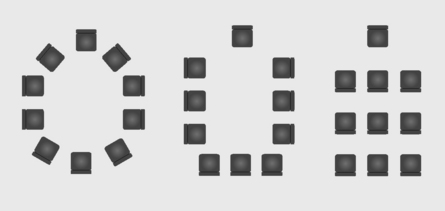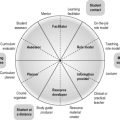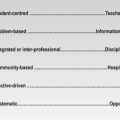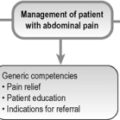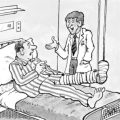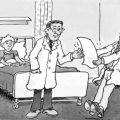22 Learning in small groups
Role of small group teaching
Learning outcomes achieved through small group teaching include:
• The development of social and interpersonal skills and communication skills such as listening and debating. These skills have been recognised as important learning outcomes to be addressed in an educational programme.
• The ability of a student to work as a member of a team and to recognise the roles of other team members. Students are encouraged in small group work to behave in a professional manner and to respect the views of others in the group. Doctors need to work effectively as team members and the skills that enable them to do so should not be taken for granted.
• The ability for students to engage in problem solving, critical thinking, the analysis of a complex issue and refining their understanding.
• The fostering of skills required by students to cope with uncertainty. This reflects medical practice where issues are frequently complex and uncertainty not uncommon.
• Innovative thinking, creativity and the development of new ideas.
• Deep learning with a more complete understanding of the subject rather than superficial learning where there is an emphasis on memorisation.
• Students reflecting on their own abilities and attitudes and exploring further the concept of professionalism in medical practice. Members of the group may find preconceived beliefs challenged.
• Students’ ability to take responsibility for their own learning.
Advantages
• Small group learning embraces the FAIR principles of effective learning as described in Chapter 2. In particular it encourages active rather than passive learning and provides learners with immediate feedback with regard to their understanding and attitude to a subject.
• Students find working in properly organised small groups engaging and motivating and are encouraged to continue further with the learning process. The approach does place demands on the students but they find the less formal atmosphere of group work more relaxed and conducive to learning. The experience may even be enjoyable.
• Small group work draws and builds on the expertise and talents of the members of the group. The less effective and efficient learners may learn from others in the group and improve their learning skills. Studies have shown that where a number of groups are addressing a problem, the results from the ‘poorest’ group are invariably better than the results from the best individual student working alone.
Problems with small group teaching
• Teachers accustomed to lecturing may be less experienced in the role of facilitator in the small group setting. As a result, small group work deteriorates into mini lectures.
• Small group teaching is considerably more difficult to manage than a lecture as more attention needs to be paid to individual students’ behaviour, personalities and difficulties. Diversity in a group promotes varied and interesting opinions, but it also has the potential to create conflict and may interfere with the proper functioning of the group.
• Scheduling the necessary number of rooms for small group teaching may present a logistical problem. If a class of 180 students has small group activities scheduled at the same time with nine students in a group, 20 small group rooms need to be made available. This is not a problem in team-based learning as the small group activities take place in a lecture theatre or large demonstration room.
• Excessive demands may be placed on teachers’ time requiring a higher than normal teacher–student ratio. This can be less of a problem if there is a greater emphasis placed on student-directed groups, or if one teacher, as in the team-based learning approach, manages a number of small groups.
• Students too often are not briefed before a small group session as to the benefits to be gained and the expected learning outcomes. This can result in them being less favourably disposed to the teaching method. They may not value what they learn in the small group work and may consider it to be a less effective use of their time when compared to attending a lecture or reading a textbook.
Techniques used in small group work
• Brainstorming. This is a creative thinking exercise in which group members generate as many ideas as possible without criticising or questioning their validity until time or ideas are exhausted. The ideas are then discussed. This approach is especially valuable to encourage creativity and generate new ideas.
• Snowballing. Learners work initially in pairs to discuss the issue or task. They then join with another pair to compare and contrast their results. The group of four learners then combines with another group of four and the exercise is repeated. The deliberations are finally discussed in a plenary session. Snowballing particularly encourages clarification of ideas and values in a non-threatening situation. A variation of snowballing is the jigsaw group. With this technique, after a topic is discussed, the groups reform into new groups, with each new group containing one member of the old group.
• Role-playing. Students enact a scenario assuming in turn the role of the doctor, nurse or patient. Role-playing is particularly valuable in exploring communication issues and attitudes. The sessions may be videotaped and this can be helpful to students who can view and analyse their own performance and learn from it.
• Journal club. This approach is frequently used in postgraduate education. Participants are asked to present and comment on recent papers in the medical literature. The group then discusses the comments.
• Tutorial/seminar. Tutorials are particularly helpful to enable students to critically probe subject matter in more detail. This helps them to clarify and expand on their understanding. Triggers such as clinical photographs, a videotape clip or a short student presentation may be used as a springboard for the tutorial. In a tutorial, the group can discuss material that has been covered in a lecture or in a directed self-learning exercise. The tutorial may be focused on aspects of the subject where students have encountered difficulties.
• Problem-based learning. Small group work plays a key role in PBL as discussed in Chapter 14. Group discussions are directed around a problem presented to the group. The students’ learning needs relating to the problem are identified.
• Clinical teaching. Teaching is conducted with a small number of students around patients in the ward or outpatient department. Clinical skills centres also provide the setting for clinical teaching with small groups using simulated patients and models. Clinical teaching is discussed in more detail in Chapter 24.
The role of the teacher
• chair person – eliciting information and opinions from the group and managing the group process
• consultant – providing information or specialist knowledge in an area
• observer – commenting on the group discussion at appropriate places
• Devil’s advocate – confronting and challenging the group
• counsellor – releasing tensions in the group where members feel threatened or where some students dominate the discussions.
Implementing small group work
A number of tasks have to be carried out at each stage of a small group session.
Before a small group activity
• Decide which approach to small group work will be adopted and the types of small group activities to be included. For example, will there be an element of brainstorming or snowballing?
• Determine the number of students in the group and the composition. Group size can vary but a generally accepted optimum number of students is seven or eight. In some situations this has to be expanded but should probably never exceed 12.
• Arrange the venue for the group meeting and the seating arrangements in a way that will encourage discussion. Figure 22.1 shows three scenarios. The first is the preferred option and maximises the interaction of the group. The second emphasises the role of the teacher or group leader. The third replicates a lecture theatre setting and should be avoided.
• Create the right learning environment. For example, noise from adjacent rooms can be a distracter.
• Consider and specify the expected learning outcomes of the session. These will reflect both the subject matter or theme for the group session and also more generic competencies such as reflection and interpersonal skills.
• Plan the necessary resources, e.g. trigger material in the form of a short video clip, case study or published paper. In the clinical context there are real or simulated patients.
• Brief the students in advance if you expect them to do some preparatory work or gain practical experience in the area prior to the small group session.
During a small group activity
• The group members should introduce themselves to each other and state their personal goals and expectations. This sets the scene for the work to be done.
• Review the expected learning outcomes and how these will be achieved. Students may enter the small group activity with some reluctance, feeling the time spent is wasteful and that they will learn better in some other way. One of the common reasons for groups failing is the lack of clear goals and outcomes.
• Establish the ground rules for working as a group, recognising that some people may feel threatened in the group situation. Rules should ensure that contributions are received positively. A typical rule might be that only one member talks at any one time and that all members contribute.
• Create a positive atmosphere for the students’ learning. There has to be an atmosphere of mutual trust and respect and they should feel comfortable enough to expose their areas of weakness.
• Focus the group on the task in hand. How this is done will depend on the agreed learning outcomes and group methods adopted. Keep the learning process moving.
• Encourage participation from members of the group by using open-ended questions, listening to what is being said and responding. Monitor the progress of each student in the group.
• Avoid being the centre or focus of the small group activity and do not provide information that other members of the group can provide or that they can get elsewhere.
• Keep the discussion at the appropriate level. It should not be boring or over-challenging.
• Recognise the different roles group members play, for example information provider or influencer, and use this information to help the group accomplish the task.
• Tackle problems in the group, such as a dominant, garrulous or lazy learner, by calling ‘time out’ and asking the group how they want to solve the issue.
• Towards the end of the session summarise what has been achieved and plan what is expected of the group before they next meet.
After the small group activity
After a small group session be sure to:
• Support any follow-up actions identified at the group meeting. This may include access to further learning opportunities or communication online between group members.
• Plan any further small group sessions if required.
• Complete any student attendance sheets or student evaluation required.
• Evaluate the small group session, for example through student feedback forms. Reflect on the experience gained by the students and yourself, and consider how the small group session might be improved if it has to be repeated.
Reflect and react
1. Are you making sufficient use of small group methods in your teaching programme?
2. If you are using or considering using small group teaching, look again at the learning outcomes you expect your learners to achieve. How do these compare with the suggested outcomes for small group work described above?
3. Which small group methods would be appropriate in your own context and what is your role in the group?
4. Would attending a staff development programme on small group teaching be helpful to you?
Edmunds S., Brown G. Effective Small Group Learning. AMEE Guide No. 48. Dundee: AMEE, 2010.
An overview of the use of small group methods in medicine and what makes them effective.
Crosby J.R., Hesketh E.A. Developing the teaching instinct: 11: Small group learning. Med. Teach.. 2004;26:16-19.
A brief guide to the use of small group learning in medicine.
McCrorie P. Teaching and leading small groups. In: Swanwick T., editor. Understanding Medical Education: Evidence, Theory and Practice. Chichester: Wiley-Blackwell, 2010.
A useful introduction to the use of small group work in medical education.
Steinert Y. Twelve tips for effective small-group teaching in the health professions. Med. Teach.. 1996;18:203-207.
Practical suggestions for successfully implementing small group learning.

